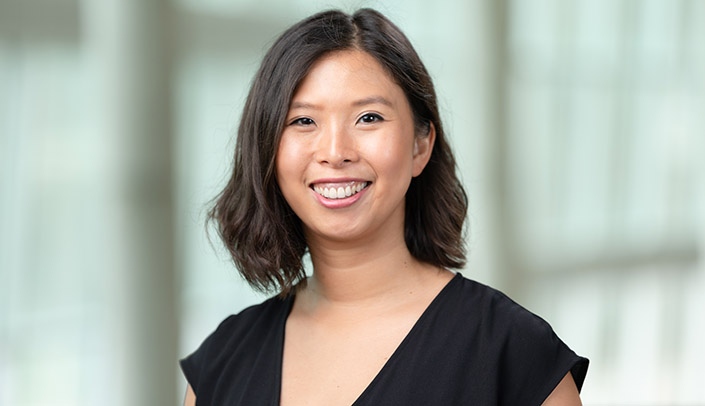Growing up in Malaysia, Caroline Ng, PhD, remembers being told to alert her parents if she had periodic fevers and chills — signs of malaria infection. Although she herself never got infected, she gained a strong desire to understand the disease.
Next week, Dr. Ng, an assistant professor in the UNMC Department of Pathology and Microbiology, will be a keynote speaker at the first Women in Malaria Conference. This conference, the first of its kind, has particular significance, Dr. Ng said. The conference amplifies women’s voices, which historically have been under-represented in scientific research.
“It is important for the younger generation of aspiring scientists, both men and women, to see equitable and inclusive representation of all voices,” Dr. Ng said. “An equitable workplace environment helps everyone, not just those who have been marginalized.”
At the conference, Dr. Ng will discuss her research, which is aimed at understanding resistance to artemisinin. This drug is a component of artemisinin-based combination therapies, which is currently recommended by the World Health Organization as first-line therapy for falciparum malaria, but areas in Southeast Asia are finding that this treatment does not clear parasites as effectively as it once did.
Speaking during the “Drug and Vaccine Development and Resistance” portion of the conference, Dr. Ng will discuss her work with proteasomes — basically the garbage disposals of the cell, degrading old or damaged proteins. Dr. Ng’s research suggests that parasite-specific proteasome inhibitors synergize with a select subset of compounds, including artemisinin, which means that you require less of each drug to kill the parasite.
“What was confounding is that each of these drugs that synergize with proteasome inhibitors all have disparate modes of action,” Dr. Ng said. “We showed that all of these compounds activate what we call the unfolded protein response, which is a cellular stress system that is conserved from malaria parasites all the way to humans. When you have an insult, this is how cells respond.”
When the response is activated, the parasites must rely more on the proteasome. Other groups previously found that a mutation in the parasite’s Kelch13 protein confers artemisinin resistance. But even though the parasites still have this mutation, with an additional mutation in the proteasome, Dr. Ng and her team have discovered that the malaria parasites are compromised in their resistance to artemisinin and the related drug OZ439, which is currently in clinical trials and was synthesized by Jonathan Vennerstrom, PhD, of the UNMC Department of Pharmaceutical Sciences.
“That’s quite surprising and directly implicates the proteasome in mechanisms that the parasite uses to mediate artemisinin resistance,” she said. “Since we know the proteasome is involved in this kind of resistance, we now can target the proteasome along with artemisinin. Then the parasites will not be able to evolve resistance.”
Artemisinin-based combination therapies have reduced the number of cases and deaths due to malaria by about 50% over the past two decades. Even so, in 2019 malaria still infected 200 million and killed about half a million people — the equivalent of the entire population of Omaha.
“We don’t want artemisinin to fail, because it takes over 10 years and more than 2.5 billion dollars to make a drug,” Dr, Ng said. “So we think we are seeing the tip of the iceberg, and we want to get ahead of it before it becomes true resistance and we lose millions more lives a year.”

Congratulations Caroline – keep up the good work!